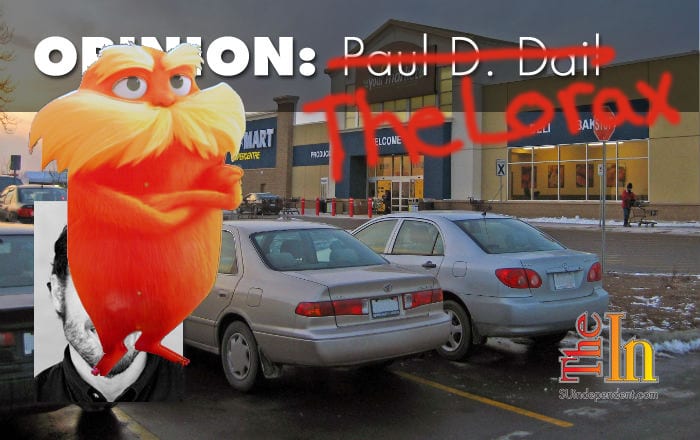 |
| Lorax image: Rusty Clark, Brevard Zoo |
Written by Paul Dail
In “The Lorax” by Dr. Seuss, when challenged by the titular character for his ethically questionable actions, the Onceler says he plans on “biggering and biggering and BIGGERING and BIGGERING” his company.
On March 8, The Independent published a letter from the Walmart director of communications, Delia Garcia, in response to an opinion piece I wrote approximately a month earlier entitled, “The prospect of new jobs is not enough to justify growth.”
I mention the title of the article for two reasons. Well, three if you count the fact that I want you to read it after you finish this one, but the first reason is some clarification. As easy as it may have been, my original opinion piece wasn’t a “bash Walmart” article. It was saying that when it comes to considering new industries for growth, the practices of a business should be just as important as the new jobs they might offer.
Having said that, it’s also important to note that to an extent, I subscribe to the capitalist philosophy that if one company can beat out another, it’s survival of the fittest. However, as I responded to a commenter after my original opinion piece, it seems like “the fittest” and “the fairest” are often miles apart.
But I am not here offering up a response to a response to my response to their irresponsibility (everybody still with me?), although I will say I cringed a little when I heard that the Almighty Walmart had read my little opinion piece and had responded. I won’t deny that I was a little nervous to see what they would say.
It was much shorter than I thought it would be.
And it still didn’t answer some of my questions. And evaded others, like the fact that they can say that they offer wonderful benefits packages yet not address how many of their employees can’t actually afford those packages considering the percentage of employees already relying on public assistance to make up the difference the corporation isn’t providing in their paycheck for basic survival.
In addition, it’s just hard to argue with the countless stories I’ve heard from friends who have themselves been employed or know someone employed by Walmart.
In a perfect world, when a Walmart came to town, they wouldn’t just knock out the weaker, overpricing yet underserving competition—thereby upping the bar for other businesses in the community—but they would also treat their employees just as well—if not better—than the competition they had just eliminated. Much as the corporate offices would like me to believe that is the case, I’m just not seeing it.
However, putting all that aside, had they done their own research, they might have caught me with my pants down. Or rather, my two-year-old son’s pants down.
Wow, that sounded bad, but give me a couple sentences because this ties into my second point/question/confession regarding the subject matter of my original opinion piece, I promise.
In “The Lorax,” after declaring his intentions on biggering, the Onceler goes on to say that he’s going to continue chopping down Truffula Trees and turning them into Thneeds, “which everyone, EVERYONE, EVERYONE needs!”
And there’s the rub. I bring up the topic of my original opinion piece because I wasn’t necessarily bashing Walmart, but can you be critical of a business’s practices on one hand and support that business with the other?
Because when you live in a town the size of Cedar City, what is a person to do when they need, NEED, NEED something like diapers?
See? I told you I’d tie it back to my two-year-old. But honestly, it’s not a great example. In southern Utah, you can always buy diapers at Smith’s or Lin’s, and while they’re not necessarily “ma and pa” grocers (and certainly considerably more expensive than Walmart for the amount of diapers you’re gonna need), it still feels a little better, a little more like spending locally.
But what about that other stuff? I don’t really indulge in buying new things for myself besides occasional music and books (which I can usually buy local. Or again, a little closer to local and with good people at the helm of the storefront), but I am a parent of young children.
And for Christmas, my five-year-old daughter wanted the Disney Rapunzel Barbie.
I know, I know. There’s a whole other opinion topic or two in that statement, but for the purpose of this piece, my first confession is that as a consumer, I have come to terms with providing my children with a reasonable amount of what would be considered fairly traditional toys and other play things.
In Cedar City, (as with many other towns across the country), when it comes to finding certain items (such as the Rapunzel Barbie or the G.I. Joe with the Kung Fu Grip), there are no places besides Walmart that are less than an hour drive away, and even then, you’re just going to another box store.
So am I supposed to sacrifice my child’s happiness to make a moral statement simply because I would have to buy something at Walmart? Well, here comes confession number two. I have been a Walmart shopper when it comes to these things.
But I’ve never felt great about it.
When Amazon entered the picture, the waters got even murkier. I felt a little better about using Amazon because I had heard they treated their employees better. It was like driving down to St. George to go to Target. But I didn’t have to actually go anywhere.
By the way, Amazon doesn’t treat their employees that much better. The comparison from warehouse to retail jobs is like apples to oranges when it comes to pay, leaving the benefits package for comparison. It is cool that Amazon pays for up to 95 percent of their employees’ tuition—even if the coursework is unrelated to a career at Amazon—but much of the rest of their benefit package is comparable to Walmart’s according to a CNN Money report.
However, many would say that even just the tuition reimbursement is a huge benefit. While the comments I saw in response to the previous articles which suggested that only people with high school diplomas or less work in places such as Walmart were wrong in my opinion (especially when it comes to small towns like Cedar City), it can’t be denied that continuing your education opens up more doors beyond the warehouse or retail industry.
Yet even when I thought Amazon was treating their employees better in more ways than just a tuition reimbursement, I still recognized that I wasn’t supporting anything in my community besides the UPS guy. I’m not a completely heartless jerk. While Walmart may not be the best employer in the land, they still are a large employer where I live, but my thought (read: justification) was that choosing to support another employer that treats their employees better should raise the bar.
Or maybe since Walmart only has to compete with Amazon for employees in the limited locations where Amazon has distribution centers, there isn’t much pressure to do better in other places, even if it’s only to offer things like tuition reimbursement.
Shouldn’t there be, though? Shouldn’t this be a company we can admire?
Especially considering they have our Thneeds?
In the end of “The Lorax” (SPOILER ALERT), the Lorax lifts himself away from the crumbling Onceler empire, and the tyrant realizes the error of his ways.
That’s what it’s about: trying to make things better. To return to my earlier comment, wouldn’t it be nice if Walmart was the best employer in the land, if they not only knocked out inferior competition but then also created an environment where people wanted to work?
We may need their Thneeds, but it would be nice if we could feel better buying them in their store.
Paul D. Dail received his BFA in English with a Creative Writing emphasis from the University of Montana, Missoula. In addition to news and his bi-weekly opinion column, he also enjoys writing creative nonfiction and fiction (with a penchant for the darker side of the page). His collection of flash fiction, “Free Five,” has spent over a year and a half in the top 50 Kindle Horror Shorts Stories since its publication in 2012.
Currently Paul lives on the outskirts of Kanarraville, surrounded by the sagebrush and pinyon junipers, with his wife and two children. Read more about him at www.pauldail.com. While he prefers that any comments directed at a specific article be posted in a public forum, he welcomes all other correspondence at [email protected]



